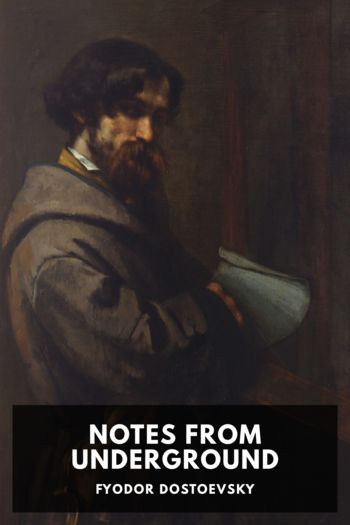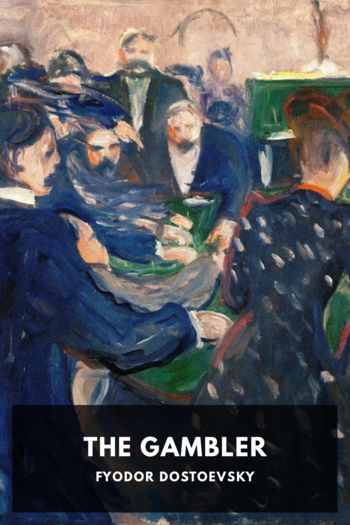Notes from Underground by Fyodor Dostoevsky (best black authors .txt) 📕

- Author: Fyodor Dostoevsky
Book online «Notes from Underground by Fyodor Dostoevsky (best black authors .txt) 📕». Author Fyodor Dostoevsky
I went out of the tavern straight home, confused and troubled, and the next night I went out again with the same lewd intentions, still more furtively, abjectly and miserably than before, as it were, with tears in my eyes—but still I did go out again. Don’t imagine, though, it was cowardice made me slink away from the officer; I never have been a coward at heart, though I have always been a coward in action. Don’t be in a hurry to laugh—I assure you I can explain it all.
Oh, if only that officer had been one of the sort who would consent to fight a duel! But no, he was one of those gentlemen (alas, long extinct!) who preferred fighting with cues or, like Gogol’s Lieutenant Pirogov, appealing to the police. They did not fight duels and would have thought a duel with a civilian like me an utterly unseemly procedure in any case—and they looked upon the duel altogether as something impossible, something freethinking and French. But they were quite ready to bully, especially when they were over six foot.
I did not slink away through cowardice, but through an unbounded vanity. I was afraid not of his six foot, not of getting a sound thrashing and being thrown out of the window; I should have had physical courage enough, I assure you; but I had not the moral courage. What I was afraid of was that everyone present, from the insolent marker down to the lowest little stinking, pimply clerk in a greasy collar, would jeer at me and fail to understand when I began to protest and to address them in literary language. For of the point of honour—not of honour, but of the point of honour (point d’honneur)—one cannot speak among us except in literary language. You can’t allude to the “point of honour” in ordinary language. I was fully convinced (the sense of reality, in spite of all my romanticism!) that they would all simply split their sides with laughter, and that the officer would not simply beat me, that is, without insulting me, but would certainly prod me in the back with his knee, kick me round the billiard-table, and only then perhaps have pity and drop me out of the window.
Of course, this trivial incident could not with me end in that. I often met that officer afterwards in the street and noticed him very carefully. I am not quite sure whether he recognised me, I imagine not; I judge from certain signs. But I—I stared at him with spite and hatred and so it went on … for several years! My resentment grew even deeper with years. At first I began making stealthy inquiries about this officer. It was difficult for me to do so, for I knew no one. But one day I heard someone shout his surname in the street as I was following him at a distance, as though I were tied to him—and so I learnt his surname. Another time I followed him to his flat, and for ten kopecks learned from the porter where he lived, on which storey, whether he lived alone or with others, and so on—in fact, everything one could learn from a porter. One morning, though I had never tried my hand with the pen, it suddenly occurred to me to write a satire on this officer in the form of a novel which would unmask his villainy. I wrote the novel with relish. I did unmask his villainy, I even exaggerated it; at first I so altered his surname that it could easily be recognised, but on second thoughts I changed it, and sent the story to the Otetchestvenniya Zapiski. But at that time such attacks were not the fashion and my story was not printed. That was a great vexation to me.
Sometimes I was positively choked with resentment. At last I determined to challenge my enemy to a duel. I composed a splendid, charming letter to him, imploring him to apologise to me, and hinting rather plainly at a duel in case of refusal. The letter was so composed that if the officer had had the least understanding of the good and the beautiful he would certainly have flung himself on my neck and have offered me his friendship. And how fine that would have been! How we should have got on together! “He could have shielded me with his higher rank, while I could have improved his mind with my culture, and, well … my ideas, and all sorts of things might have happened.” Only fancy, this was two years after his insult to me, and my challenge would have been a ridiculous anachronism, in spite of all the ingenuity of my letter in disguising and explaining away the anachronism. But, thank God (to this day I thank the Almighty with tears in my eyes) I did not send the letter to him. Cold shivers run down my back when I think of what might have happened if I had sent it.
And all at once I revenged myself in the simplest way, by a stroke of genius! A brilliant thought suddenly dawned upon me. Sometimes on holidays I used to stroll along the sunny side of the Nevsky about four o’clock in the afternoon. Though it was hardly a stroll so much as a series of innumerable miseries, humiliations and resentments; but no doubt that was just what I wanted. I used to wriggle along in a most unseemly fashion, like an eel, continually moving aside to make way for generals, for officers of the guards and the hussars, or for ladies. At such minutes there used to be a convulsive twinge at my heart, and I used to feel hot all down





Comments (0)